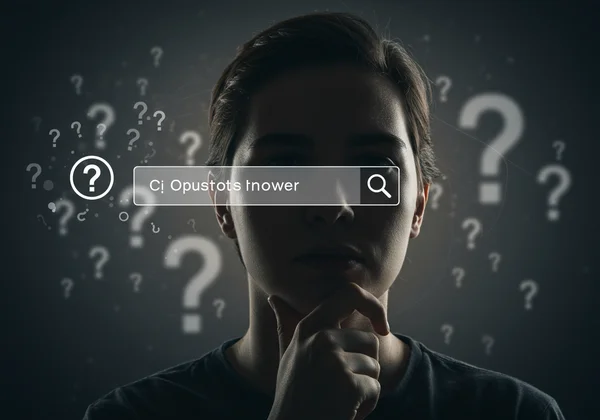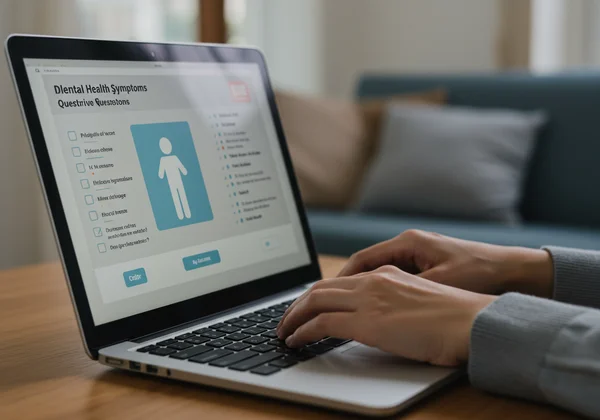偏执型精神分裂症:症状与求助指南
感觉被人监视、听到别人听不到的耳语,或深陷强烈的猜疑中,都可能是一种孤立而令人恐惧的经历。如果您或您关心的人正面临这些令人不安的想法,您可能正在寻找答案,想知道是否患有偏执型精神分裂症。 我是否患有精神分裂症? 这个在焦虑时刻常被输入的问题,值得一个清晰而富有同情心的回答。本指南将阐明偏执型精神分裂症的具体症状,并通过免费的 偏执型精神分裂症测试,帮助您迈出了解自身经历的关键第一步。
独自应对这些困扰是困难的,但知识是赋能的第一步。了解这些迹象至关重要,进行初步的自我评估可以在安全、私密的环境中提供初步的见解。这是在寻求专业建议之前整理您的思绪和感受的一种方式。要开始探索您的经历,您可以在我们的网站上 迈出第一步。

什么是偏执型精神分裂症?定义一种特定类型
尽管“偏执型精神分裂症”一词在最新的诊断手册中已不再是正式诊断(现已将所有类型归类为“精神分裂症”),但它仍被广泛用于描述该病症的一种特定表现形式。这种亚型主要特点是突出的妄想和幻听。与其他形式的精神分裂症不同,有这些症状的个体通常没有明显的言语紊乱、行为紊乱或情感迟钝。
这种区别很重要,因为它突出了特定的挑战。患者的认知功能和情感表达可能相对完整,这有时会使潜在的病情对他人而言不那么显而易见。然而,其内在现实往往充满了恐惧、焦虑和深刻的不信任感,这些都由强大而令人信服的症状所驱动。
理解被害妄想
偏执型精神分裂症的核心是 被害妄想。这些是强烈、固定、错误的信念,认为自己正被人密谋、威胁、骚扰或监视。这远非简单的怀疑,而是一种根深蒂固的信念,即使有明确的反证也难以动摇。经历这些妄想的人可能相信政府机构正在监视他们的思想,邻居正在密谋伤害他们,或者他们的食物被下毒了。这些信念并非个人观点——对个体而言,它们是绝对的现实,造成极大的痛苦,并影响他们信任他人以及在生活中感到安全的能力。
幻听:一种常见的伴随症状
另一个标志性症状是 幻听,最常见的表现是听到声音。这些声音可能是批评性的、威胁性的或命令性的,经常评论患者的行为或想法。它们听起来和任何外部声音一样真实,使得将它们与现实区分开来变得极其困难。这些幻觉的内容常常强化妄想信念。例如,一个有被害妄想的人可能会听到声音证实他们对他人密谋反对他们的恐惧。这形成了一个强大且令人痛苦的恐惧循环,并对恐惧进行验证,从而进一步加剧了个体的孤立感。

偏执型精神分裂症与其他类型的区别
主要区别在于 症状表现。虽然其他类型的精神分裂症可能以更突出的思维紊乱、言语混乱或严重缺乏情感表达(称为“情感平淡”)为特征,但偏执型表现则主要以结构化的妄想和幻觉为特征。个体在特定妄想信念之外的思维可能保持逻辑和条理。这使得家人和朋友难以理解患者挣扎的深度,因为他们在生活的许多方面可能表现出高度的功能性,却同时与一个可怕的内在现实作斗争。
识别偏执型精神分裂症的关键迹象
识别偏执型精神分裂症的迹象是早期干预的关键。这些症状可能逐渐发展,最初可能被误认为是性格怪癖、压力或其他心理健康问题。了解具体的模式可以帮助您或您所爱的人识别何时该寻求帮助。这种知识是采取积极行动的基础,例如使用 精神分裂症评估测试 获取初步见解。
需要留意的早期预警信号
在妄想和幻觉等明确精神病性症状出现之前,通常会有一个前驱期。在此期间, 行为和思维方面可能出现微妙变化。这些早期迹象可能包括:
- 社交退缩和孤立加剧。
- 普遍的猜疑或不信任感。
- 注意力不集中或思维组织困难。
- 个人卫生或自我照顾能力下降。
- 出现不寻常或强烈的全新信念,常带有宗教或哲学色彩。
- 感知变化,例如感觉颜色更鲜艳或声音更响亮。
识别这些早期预警信号至关重要。及时解决这些问题可以带来更好的长期结果。如果这些经历与您产生共鸣,使用保密的在线工具 探索您的症状 可能会有所帮助。

轻度偏执型精神分裂症可能是什么样子
在其较轻的形式中,偏执型精神分裂症可能不会立即显现。一个人可能在工作或学校表现良好,但内心深处却怀有根深蒂固的私人猜疑。他们可能显得戒备、鬼鬼祟祟,或倾向于将社交暗示误解为敌意或威胁。例如,他们可能认为同事在背后议论他们,或者一个友好的姿态是一种变相的侮辱。尽管他们可能不会公开表现这些信念,但这种持续的高度警惕和焦虑状态可能会耗费精力,并损害他们的人际关系和整体福祉。这是一种持续的、低水平的痛苦,悄悄侵蚀着他们的安全感。
区分偏执与临床妄想
重要的是要理解日常偏执与 临床妄想 之间的区别。许多人都会经历怀疑或担忧的时刻,比如想知道朋友是否生他们的气,或者晚上独自走路时感到不安。这种偏执通常是短暂的,基于某种看似合理(即使不太可能)的现实,并且可以用证据来消除。然而,临床妄想是不可动摇的。它们是根深蒂固、错误的信念,不属于个人文化背景,即使面对矛盾的证据也依然坚定不移。区别在于信念的僵化及其与共享现实的脱节。
您的第一步:进行初步精神分裂症测试
如果本文描述的迹象和症状让您感到熟悉,不确定性和恐惧感可能会让人不知所措。您可能想知道接下来该怎么做。关键且赋能的第一步是寻求结构化的信息。进行初步的在线 精神分裂症测试 可以帮助您整理自己的经历,并为与医疗专业人员的对话提供一个起点。
免费、保密自我评估的价值
向他人倾诉这些经历可能会令人望而生畏。这就是 免费、保密自我评估 成为宝贵资源的地方。我们的 免费精神分裂症测试 旨在成为一个安全、私密的初步步骤。它基于已建立的前驱期问卷,允许您在舒适的家中匿名回答有关您近期想法和感受的问题。没有评判,只有一个旨在为您提供初步见解的工具。结果是即时的,帮助您更好地理解自己的经历。如果您准备好了,现在就可以 尝试我们的免费工具。

自我评估后何时寻求专业帮助
需要明确的是,在线筛查工具并非诊断工具。其目的是提供信息并识别潜在风险信号,而非做出诊断。无论您的结果如何,如果您正经历严重的痛苦或症状正在干扰您的日常生活,那么 寻求专业帮助 至关重要。自我评估可以成为迈向下一步的有力桥梁。它可以让您有信心和语言向医生或心理健康专业人士描述您所经历的一切。
准备专业咨询
您的自我评估结果可以作为一份有用的文件,在咨询时带给医生。为了准备您的预约,请考虑采取以下步骤:
- 写下您的症状:记下您的经历、发生的频率以及它如何影响您的生活。
- 列出关键个人信息:包括任何主要压力源、近期生活变化以及精神健康状况的家族史。
- 准备问题:写下您对医生提出的任何问题,例如“下一步是什么?”或“需要进行哪些评估?”
采取这些积极步骤可以使咨询更有效且不那么令人望而生畏。评估提供了一个起点,您可以 获取初步见解 来帮助您准备这次重要的对话。
迈向下一步:知识、支持与健康
了解偏执型精神分裂症的症状是强大自我关怀和支持的表现。识别日常怀疑与临床妄想的区别,识别早期预警信号,以及了解幻觉的感受,都能揭开这种复杂疾病的神秘面纱。它用知识驱散恐惧,用明确的前进方向取代不确定性。
请记住,在这段旅程中您并不孤单。您的经历是真实的,迈出了解它们的这一步是力量的象征。您现在能做的最重要的事情是继续寻求信息和支持。保密的在线筛查是开始这一过程的一种安全且便捷的方式。
我们鼓励您使用我们免费、保密的工具,对您的经历获得初步见解。 立即进行保密测试 ,用知识武装自己,迈出通往健康的下一步。
免责声明:本测试并非诊断工具。它是一个初步的自我评估,仅供参考,不能替代专业的临床评估。如果您对自己的心理健康有疑虑,请咨询合格的医疗保健提供者。
关于偏执型精神分裂症与测试的常见问题
我是否患有精神分裂症?
只有合格的心理健康专业人士(如精神科医生或心理学家)才能提供准确的精神分裂症诊断。尽管您可能在自己身上识别出症状,但诊断需要全面的临床评估。像 在线精神分裂症测试 这样的自我评估,可以作为有用的第一步,帮助您决定是否应寻求专业意见。
如何进行精神分裂症测试?
进行精神分裂症测试通常始于咨询初级保健医生或心理健康专家。他们会进行临床访谈,讨论您的症状和个人病史,并排除可能导致您症状的其他医疗状况。这就是为什么使用初步 精神分裂症评估 的结果有助于开启这次对话。
哪些测试可以明确确诊精神分裂症?
没有单一的血液测试、脑部扫描或 精神分裂症实验室测试 可以明确确诊该病症。诊断是通过全面的精神科评估进行的,以评估症状、行为和功能障碍在一段时间内的表现。这一彻底的过程确保了对您心理健康的准确理解。
精神分裂症患者能完全康复吗?
尽管精神分裂症是慢性疾病,但康复是可能且有意义的。对许多人而言,康复意味着学会有效管理症状、实现个人目标,并过上充实而独立的生活。通过持续的治疗,包括心理治疗、药物治疗和强大的支持系统,许多精神分裂症患者的症状和生活质量都得到了显著改善。